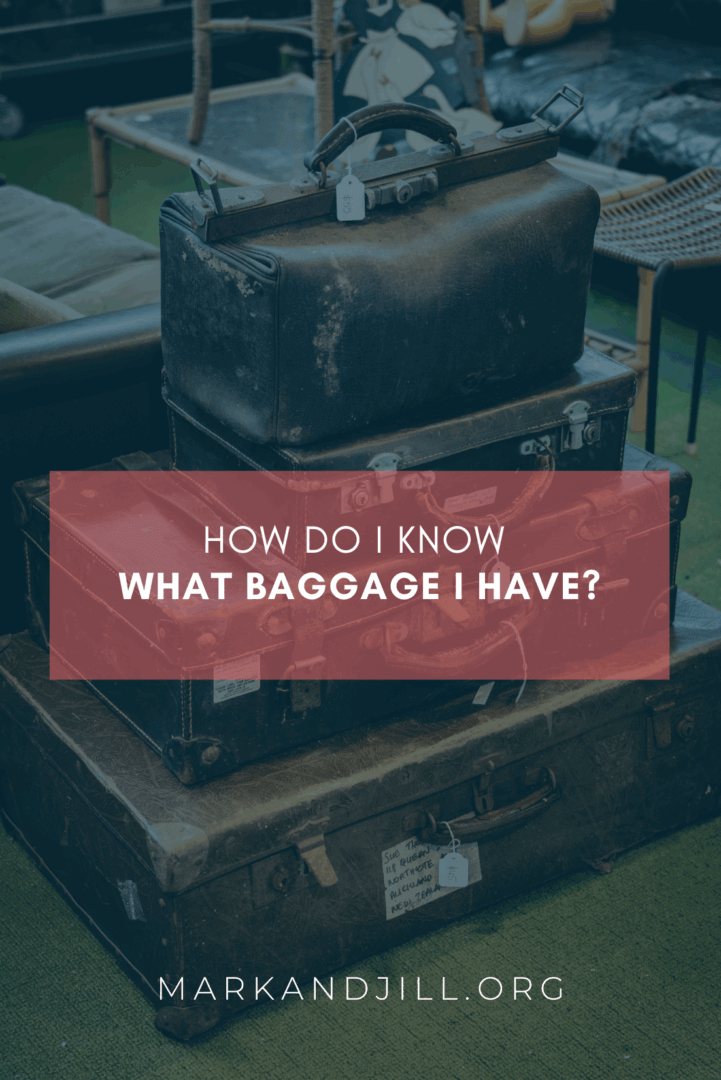
Jill: Do you carry emotional baggage around with you? If so, you’re not alone. We all have it, and at times, it may feel like we are weighed down by the burden of dragging it around from place to place. One of the hardest truths about baggage is that it doesn’t just impact us on an individual level. Whether you’re dating, engaged, newly married, or you’ve been married for decades, our baggage can start to stack up and sabotage our relationships if we don’t take steps to unpack it.
Mark: This concept of baggage isn’t new. However, something happened recently that really got us thinking. We’ve been teaching a lot about baggage lately, and when we were speaking on a marriage cruise, several people
came up to us saying the same thing:
“Ok—I totally get the ‘baggage’ thing. But how do you figure out what baggage you’re carrying?”
Jill: We were so surprised to see this same curiosity coming up in couple after couple—and that’s why we want to talk about it now.
Mark: Exactly—and since sorting through our baggage has been so impactful in moving our marriage from Mark & Jill 1.0 to Mark & Jill 2.0, we wanted to take some time to give you some tools to identify what baggage you may have.
Jill: We define “baggage” as places where we need to pursue personal growth, instances of trauma or hurt from the past that remain unhealed, and learned behaviors, habits, and thinking patterns from our childhood that no longer serve us.
Mark: Everyone brings their “stuff” to a relationship. Sometimes these are small suitcases, and other times they are huge trunks! But whether you’re carrying a suitcase or a whole semi-truck worth of baggage, everything from your upbringing and self-perception to your weaknesses and personal faith will shape your marriage—for better or worse. This was a hard lesson we had to learn, but the truth is, everyone needs to take the time to own and deal with whatever baggage they may have if they want to bring their best self into their relationship.
Jill: If you’d like even more resources on this topic, we discussed it on a recent episode of the No More Perfect Podcast. We also did an episode in which I shared more about my personal journey and the dysfunctions I brought to our relationship that contributed to Mark’s affair.
Mark: Now that we have a common definition of what baggage is, let’s take a look at some of the different kinds of baggage and the impact they can have on our relationships:
Common Types of Baggage
Jill: One of the reasons why it’s hard to identify your baggage is because there are so many different kinds! We can typically spot the big footlockers—like physical trauma or a divorce—but some of the smaller baggage you may be toting around can be harder to find and identify.
Mark: Often, these pieces of baggage have to do with childhood experiences or long-held beliefs we don’t even realize we have. However, the origin of your baggage may surprise you. We tend to think emotional baggage only comes from close relationships—like a parent or spouse—but it can just as easily come from a harsh coach, teacher, or other authority figure. Maybe someone repeatedly belittled you or said things like, “Why would you do that?” or “You’re so stupid—you’ll never amount to anything.” As you can see, some baggage is difficult to uncover because the roots run deep, and we aren’t always aware of how much an experience has stuck with us until it bubbles to the surface.
Jill: The baggage we carry could be anything—from a traumatic event, to a difficult personal experience, or even just the way we were raised. While this is certainly not an exhaustive list, here are a few of the most common categories of baggage we encounter:
- Baggage of childhood – This baggage is most likely to come out when another person says or does something, and our emotional reaction feels way out of proportion. A telltale sign of this baggage is under or overreactions. For example, Mark held a belief that was rooted in his childhood: What I say doesn’t matter. That kind of baggage can lead someone to feel offended or defensive in situations that don’t really call for it—like when a spouse casually suggests a different way to load the dishwasher. It seems minor on the surface, but for Mark, it triggered something deeper.
- Baggage of attachment – Our attachment styles are so important, because they are foundational to how we behave in relationships. The roots of attachment-based wounds can also often be traced back to our childhood. Depending on the attachment style we’ve developed, the baggage of our attachment will either cause us to be insecure about how our spouse feels about us (regardless of how they actually feel), or it can cause us to avoid deep connection and keep our spouse at arm’s length. If you’d like to learn more about this topic, read our guide to attachment styles or take our attachment quiz.
- Baggage of value – Where do you turn to know your worth? Is it found in the job you have? Other people’s praise and recognition? Ultimately, our value should be determined by who God says we are. However, our baggage may have us turning to other things to reassure us we have value.
- Baggage of painful experiences – Our experiences shape us, for better or worse. There are some experiences that are so painful or traumatic that we carry them with us long after the actual event. This could be the sting of infidelity, betrayal, the death of a loved one, and more. If we do not give ourselves the time and effort to process our pain, we may end up carrying it in unhealthy ways for our entire lives.
Mark: As you consider these four types of baggage, you may be able to start identifying the baggage you carry into a relationship. As you work to understand this part of yourself that’s hurting, you might consider stepping away from the situation the next time you have an outburst, feel angry, or retreat inward and don’t want to say anything at all. When you find yourself in these overwhelming situations, try asking yourself a few questions: What’s really going on inside of me? Where do these feelings originate? Is there another time or place that the current situation brings me back to?
Jill: This process is not completed in a day. It’s a lifelong investment to uncover the areas of your life where you need hope and healing from our heavenly Father. I promise you will never regret starting this journey. When I really committed to uncovering my baggage, I wasn’t sure if my marriage would make it. However, I knew that in order to have any hope of saving our relationship, I had to look seriously at what baggage I brought with me. The first step to becoming the version of yourself that God is doing a good work in and through is learning how to discover and identify your own unique baggage.
How to Uncover Your Baggage
Mark: There may be some baggage you are already aware of, but more often than not, our baggage flies under the radar. For the longest time, I didn’t realize I was carrying around painful baggage from my childhood that led me to believe that my thoughts and opinions didn’t matter. As a result of this baggage, I would avoid sharing my thoughts or feelings with Jill—to the detriment of our marriage.
Here are a few questions we often share with couples and individuals in our coaching to help them uncover where hidden baggage might be showing up:
#1: Where do you get stuck? An area where you are “stuck” is typically one where you experience recurring defensiveness. For example, if there has been broken trust in your relationship, you may find it difficult to move past the incident—even though the person who broke your trust is doing all the right things to rebuild it.
#2: Where do you feel insecure? This is when you have feelings of being “not enough.” We see this one often in empty nest parents who feel jealous of their child’s in-laws or perhaps slighted by how much time their child spends with other family members. Other examples can include feelings that you’ve lost a core piece of your identity after moving on from a long-time career or passion.
#3: Where are you getting feedback from others? It can be difficult to spot the areas of baggage in your own life—because you’re too close to see things objectively. A great way to uncover an area in your life that may need attention is to really listen to the feedback others are giving you with an open, humble mind. For example, if your coworkers, spouse, and family members have all told you that the way you communicate can feel overly harsh at times, that’s a good sign that you may need to unpack a piece of baggage that’s spurring you to act this way. This process may feel uncomfortable, but if the feedback is coming from a loved one, you can know there must be some truth to it.
#4: Where do you get triggered? Do you get overly angry at a certain situation or comment? Consider what is at the root of any extreme reactions you have—this includes both over AND underreacting. If you aren’t aware of any extreme reactions, this could be a good opportunity to ask a trusted friend for some feedback or observe how others react in similar situations.
Jill: In addition to these questions, it might be helpful to work alongside a therapist, counselor, or coach who can help you uncover the baggage you have and give some helpful tips on how to heal those areas.
Mark: Becoming aware of the baggage you have is an important step not only for improving your relationships and your marriage, but also growing into a healthier individual!
Jill: That’s right—and we want to offer one more resource for you if you are wanting to go even deeper and work alongside your spouse on how your baggage might be contributing to the unhealthy patterns in your relationship.
Jill: We’ve created a free Marriage Crash Course that will help you discover how to embrace imperfections, understand and appreciate your differences, rekindle your connection through small, meaningful actions, and navigate conflict with grace and understanding.
Mark: Marriage isn’t about perfection—it’s about growth, love, and faith. We’ve faced our own struggles and learned valuable lessons along the way, and now we want to share those with you.













